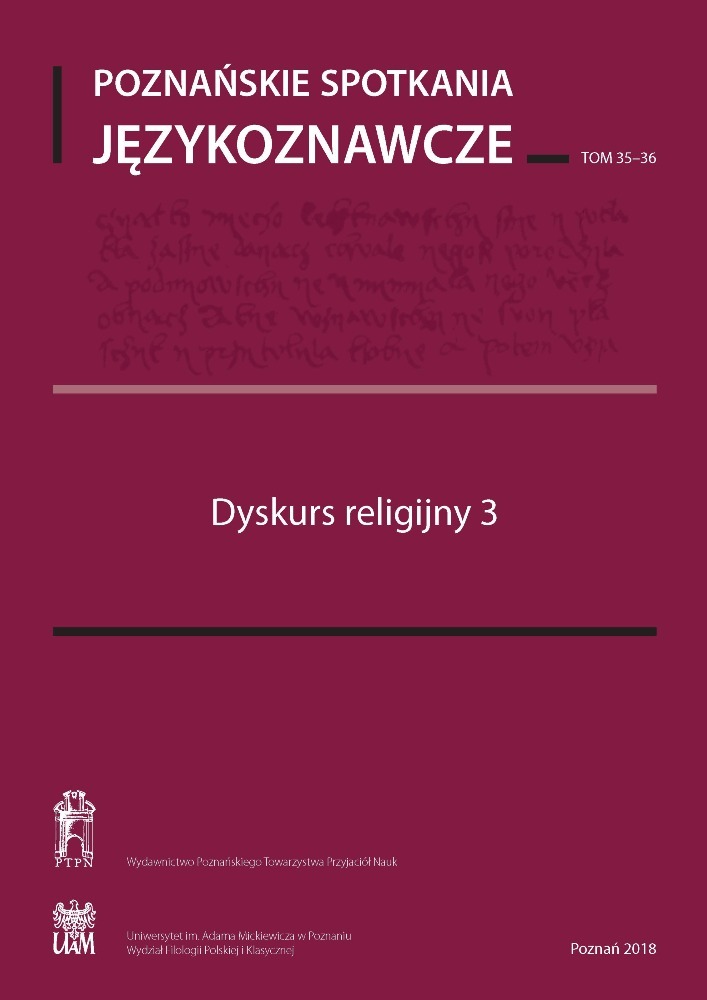Abstract
The paper presents a semantic analysis of mystical descriptions of the concept of radość (joy). First of all, the notion of mystical experience is defined and its main characteristics are presented. The first point touches upon the way in which the concept is used in mystical discourse. Notably, the evaluative potential of radość (joy) is both positive and negative; “worldly” emotions are perceived as a hindrance in a person’s contact with God and as such are treated with suspicion. Yet they are transformed by the process of sanctification into mystical blessings. The paper focuses on the experiencing party’s positive sensations in his/her body when they ”touch” the Absolute and on the mystic’s inner perception of his/her own emotions and conceptualization thereof in language. For obvious reasons, an external observer cannot see the divine reality the way a mystic does. However, by watching the person’s behavior one can see the bodily manifestations of joy, an inseparable part of a mystical experience, expressed by sensory language. Linguistic data provide evidence in favour of a theory that humans do not have any other language to share religious experience but the one that treats the body as a communicating medium. Interestingly, a mystic’s joy is dynamic and it does not exclude negative feelings, such as pain and suffering. The underlying assumption is that joy is a universal phenomenon and that in the Judeo-Christian civilization, most of the linguistic ways of expressing it rely on the same mechanisms and concepts.
References
Fabiszak M., 2000, The Concept of Joy in ME – a Semantic Analysis, w: Pase Papers in Language Studies, red. B. Rozwadowska, Wrocław, s. 105–115.
Gicala A., 2006, Expressing the Inexpressible In Mystical Experience. Conceptual Metaphor and Blending in Translations of ‘The Cloud of Unknowing’, Łask.
Gicala A., 2010, Obraz obrazu: strategia przekładu metafory w tekstach mistycznych, Kraków, w: Między Oryginałem a Przekładem XVI. Strategie wydawców, strategie tłumaczy, red. J. Brzozowski, M. Filipowicz-Rudek, s. 281–288.
Gogacz M., 1985, Filozoficzne aspekty mistyki. Materiały do filozofii mistyki, Warszawa.
Grün A., Riedl G., 1998, Mistyka i eros, Kraków.
Jan od Krzyża, 1995, Dzieła, Kraków.
KKK – Katechizm Kościoła Katolickiego, 1994, Warszawa.
Kłoczowski J.A., 2001, Drogi człowieka mistycznego, Kraków.
Kochmańska W., Taras B. (red.), 2010, Od miłości do nienawiści. Językowe mechanizmy kreowania emocji, Rzeszów.
Kołakowski L., 1987, Jeśli Boga nie ma. O Bogu, diable, grzechu i innych zmartwieniach tak zwanej filozofii religii, Londyn.
Mikołajczuk A., 2009, Obraz radości we współczesnej polszczyźnie, Warszawa.
Nowakowska-Kempna I., 1986, Konceptualizacja uczuć w języku polskim, Warszawa.
Nowakowska-Kempna I., Dąbrowska A., Anusiewicz J. (red.), 2000, Język a kultura, t. 14: Uczucia w języku i tekście, Wrocław.
Pajdzińska A., 1990, Jak mówimy o uczuciach? Poprzez analizę frazeologizmów do językowego obrazu świata, w: Językowy obraz świata, red. J. Bartmiński, Lublin, s. 87– 107.
SJP – Słownik języka polskiego, red. M. Szymczak Warszawa 1989.
Wieczorek U., 2004, O niewyrażalności w języku. Mistyka języka, w: Studia linguistica Danutae Wesołowska oblata, red. H. Kurek, J. Labocha, Kraków, s. 311–318.
Wieczorek U., 2006, Język miłości w dyskursie mistycznym św. Jana od Krzyża, w: Język religijny dawniej i dziś. Materiały z konferencji Gniezno 3–5 czerwca 2004, red. S. Mikołajczak, ks. T. Węcławski, Poznań, s. 510–517.
Wierzbicka A., 1999, Emotions across Languages and Cultures. Diversity and Universals, Cambridge.
Wilson A., 2009, Barrier and penetration imagery in altered states of consciousness discourse: replicating the five-stage model of Christian mysticism in the Bible, w: Cognitive Approaches to Language and Linguistic Data: Studies in Honor of Barbara Lewandowska-Tomaszczyk, „Polish Studies in English Language and Literature” (27), red. W. Oleksy, P. Stalmaszczyk, Frankfurt am Main, s. 357–372.
Zawada M., 2004, Antologia mistyczna, Kraków.
License
Autorzy
Autorzy tekstów przyjętych do publikacji w czasopiśmie Poznańskie Spotkania Językoznawcze są zobowiązani do wypełnienia, podpisania i odesłania na adres redakcji umowy o udzielenie nieodpłatnej licencji do utworów, z zobowiązaniem do udzielania sublicencji CC.
Zgodnie z umową, autorzy tekstów opublikowanych w czasopiśmie Poznańskie Spotkania Językoznawcze udzielają Uniwersytetowi im. Adama Mickiewicza w Poznaniu niewyłącznej i nieodpłatnej licencji oraz zezwalą na użycie sublicencji Creative Commons Attribution-NoDerivatives 4.0 International (CC BY-ND 4.0).
Autorzy zachowują prawa do dalszego, swobodnego rozporządzania utworem.
Użytkownicy
Zainteresowani użytkownicy internetu uprawnieni są do korzystania z utworów opublikowanych od 2015 r. w Poznańskich Spotkaniach Językoznawczych pod następującymi warunkami:
- uznanie autorstwa - obowiązek podania wraz z rozpowszechnionym utworem, informacji, o autorstwie, tytule, źródle (odnośniki do oryginalnego utworu, DOI) oraz samej licencji;
- bez tworzenia utworów zależnych - utwór musi być zachowany w oryginalnej postaci, nie można bez zgody twórcy rozpowszechniać np. tłumaczeń, opracowań.
Do wszystkich tekstów opublikowanych przed 2015 r. prawa autorskie są zastrzeżone.
Inne
Uniwersytet im. Adama Mickiewicza w Poznaniu zachowuje prawo do czasopisma jako całości (układ, forma graficzna, tytuł, projekt okładki, logo itp.).
